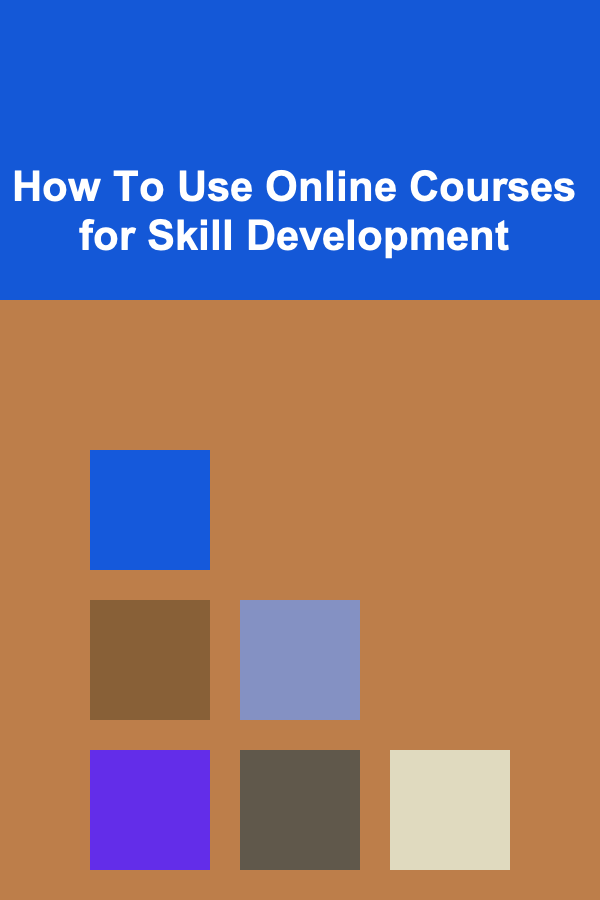
How To Use Online Courses for Skill Development
ebook include PDF & Audio bundle (Micro Guide)
$12.99$6.99
Limited Time Offer! Order within the next:

In today's fast-paced world, skill development is a vital aspect of both personal and professional growth. One of the most convenient and effective ways to enhance your skills is by taking online courses. The internet has revolutionized the way we learn, providing access to a wealth of resources across a wide range of subjects. Whether you're looking to advance in your career, pursue a passion, or switch industries, online courses can offer the flexibility, affordability, and variety needed to succeed.
In this article, we will explore how to effectively use online courses for skill development. We will cover the benefits of online learning, how to choose the right course, strategies for maximizing your learning, and how to apply your new skills in real-world settings.
The Rise of Online Learning
Over the last decade, online education has undergone a massive transformation. Once limited to a few specialized institutions and platforms, it has now become a global phenomenon. With millions of courses available on platforms like Coursera, Udemy, LinkedIn Learning, and edX, the opportunities for skill development are endless. But with so many options available, how can you make the most of this wealth of knowledge?
Why Choose Online Learning?
Accessibility and Flexibility
The most significant advantage of online learning is accessibility. No longer do you need to attend physical classes or follow rigid schedules. You can learn at your own pace, anytime, anywhere. Whether you're a full-time professional, a busy parent, or someone with a tight schedule, online courses allow you to balance your learning with other life commitments.
Affordability
Traditional education can be expensive, especially if you're pursuing a degree or specialized certification. Online courses, on the other hand, are often more affordable. Many platforms offer free courses, and even paid courses tend to be much cheaper than their in-person counterparts. Furthermore, some platforms offer financial aid or scholarships to help reduce costs, making learning more accessible to people from all walks of life.
Variety and Specialization
Online courses cover virtually every subject imaginable. From soft skills like communication and leadership to technical skills like coding and data analysis, there is something for everyone. Many platforms also allow instructors to design niche courses tailored to specific fields, giving learners the ability to explore specialized topics that might not be covered in traditional educational settings.
How to Choose the Right Online Course
Given the vast number of online courses available, choosing the right one for your skill development can be overwhelming. Here are some key factors to consider when selecting a course that aligns with your goals.
Define Your Learning Goals
Before diving into online courses, it's essential to clarify what you want to achieve. Are you looking to learn a new skill for your job? Do you want to switch careers? Or are you pursuing a personal interest or hobby? Identifying your learning objectives will help you narrow down your options and focus on the courses that are most relevant to your needs.
Research Course Content and Structure
When considering a course, take the time to research its content and structure. Read the course description thoroughly to ensure it covers the topics you're interested in. Many platforms also provide course syllabi or outlines that break down the learning modules. Look for courses that offer a comprehensive curriculum, practical examples, and engaging materials like videos, quizzes, and assignments.
Check Instructor Credentials
The quality of the course largely depends on the expertise and teaching style of the instructor. Research the instructor's background, qualifications, and experience in the field. Many courses provide information about the instructor, such as their professional history, previous students' reviews, and any other courses they've taught. Look for instructors who have a solid track record of teaching and relevant expertise.
Reviews and Ratings
Many online learning platforms allow students to leave reviews and ratings for courses. This feedback can provide valuable insights into the course's quality, the instructor's effectiveness, and how well the course meets its stated objectives. Be sure to check the reviews before committing to a course, but keep in mind that no course will have perfect ratings. Look for patterns in feedback rather than focusing on individual opinions.
Consider Course Delivery Format
Online courses come in various formats, including video lectures, text-based lessons, live webinars, and interactive workshops. Consider what learning style suits you best. Some people prefer watching video lessons, while others may learn more effectively by reading or engaging in hands-on activities. Make sure the course delivery format matches your learning preferences.
Look for Certifications or Credentials
If your goal is to enhance your career prospects, look for courses that offer a certificate or credential upon completion. Many platforms offer courses with certifications that are recognized by employers. Some even provide partnerships with universities or industry leaders, which can add credibility to the certification. However, keep in mind that certifications alone may not guarantee job opportunities, so it's essential to complement them with practical experience.
Strategies for Maximizing Your Learning
Once you've chosen the right course, it's time to start learning. However, completing a course is not just about watching videos or reading materials---it's about engaging with the content and applying what you learn. Here are some strategies to help you make the most out of your online learning experience.
Set Clear Goals and Deadlines
One of the challenges of online learning is staying motivated and on track. To combat this, set specific goals for each course. These goals could be based on completing modules by certain dates, achieving a high score on quizzes, or mastering particular skills. Establishing deadlines for yourself can help create a sense of urgency and keep you focused.
Take Notes and Stay Organized
As you progress through the course, take notes to capture key points, important concepts, and any questions you may have. Staying organized will help reinforce your learning and provide you with a valuable reference when you're applying the skills you've acquired. Some platforms also allow you to download course materials, which can be handy for offline study.
Participate in Discussions and Communities
Many online courses provide discussion forums, chat groups, or social media communities where students can interact with each other and the instructor. Participating in these discussions can deepen your understanding of the subject, offer new perspectives, and allow you to network with fellow learners. Engaging with others can also provide motivation and support when you're feeling stuck or overwhelmed.
Practice Regularly
One of the best ways to develop new skills is through practice. Whether you're learning coding, graphic design, or writing, regular practice will help reinforce the knowledge you've gained. Look for opportunities to apply what you're learning in real-world scenarios. For instance, if you're learning a programming language, try building a small project. If you're learning graphic design, create mock-ups for fictional clients.
Seek Feedback
If possible, seek feedback from others, whether it's from your instructor, peers, or online communities. Feedback can help you identify areas where you're excelling and areas where you need improvement. Constructive criticism is essential for skill development, as it provides insights into how you can enhance your performance.
Stay Consistent
Consistency is key when it comes to online learning. Instead of cramming all your study into one day, aim to dedicate a small amount of time each day or week to the course. Regular, consistent study sessions will help you retain information better and prevent burnout.
Applying Your New Skills
After completing an online course, the real challenge begins: applying what you've learned. Skill development doesn't end with passing a quiz or receiving a certificate. To truly benefit from the course, you must integrate your new skills into your daily life or career.
Build a Portfolio
If you're learning a creative or technical skill (like design, writing, or programming), building a portfolio can help demonstrate your expertise to potential employers or clients. A portfolio showcases your best work and provides tangible evidence of your abilities. Even if you're learning a non-creative skill, documenting your progress and accomplishments can be valuable when showcasing your expertise to others.
Continue to Learn
Skill development is an ongoing process. Once you've mastered one course, consider taking another to deepen your knowledge or explore new areas. Online learning platforms often recommend courses based on what you've already completed, making it easier to continue your education. Additionally, staying up-to-date with the latest trends and developments in your field will help you remain competitive in the job market.
Share Your Knowledge
Teaching others is one of the best ways to reinforce your learning. Share your newfound knowledge with colleagues, friends, or through online platforms like blogs, YouTube, or podcasts. By teaching others, you'll solidify your understanding and develop valuable communication skills.
Leverage Your Skills in the Job Market
Finally, use your newly acquired skills to advance in your career. Whether you're looking to switch industries, pursue a promotion, or start a freelance business, your online course certifications can serve as a credential to showcase your qualifications. Don't hesitate to highlight your online learning experiences in your resume, LinkedIn profile, or during interviews.
Conclusion
Online courses offer an incredible opportunity for skill development, providing flexibility, affordability, and access to expert knowledge. By choosing the right courses, engaging actively with the content, and consistently practicing your skills, you can enhance your personal and professional growth. Whether you're learning for career advancement or personal enrichment, the world of online learning is at your fingertips. All it takes is the commitment to learn and the dedication to apply your newfound skills.

How to Host a Family Olympics Day in Your Backyard
Read More
How to Tackle Stubborn Bathroom Mold and Mildew
Read More
How to Use Hooks and Pegboards for Vertical Storage in Your Home
Read More
Why You Should Create a Daily Cleaning Routine
Read More
Using Augmented Reality for Remote Assistance: A Deep Dive
Read More
Mastering Extreme Unicycling: A Comprehensive Guide
Read MoreOther Products

How to Host a Family Olympics Day in Your Backyard
Read More
How to Tackle Stubborn Bathroom Mold and Mildew
Read More
How to Use Hooks and Pegboards for Vertical Storage in Your Home
Read More
Why You Should Create a Daily Cleaning Routine
Read More
Using Augmented Reality for Remote Assistance: A Deep Dive
Read More